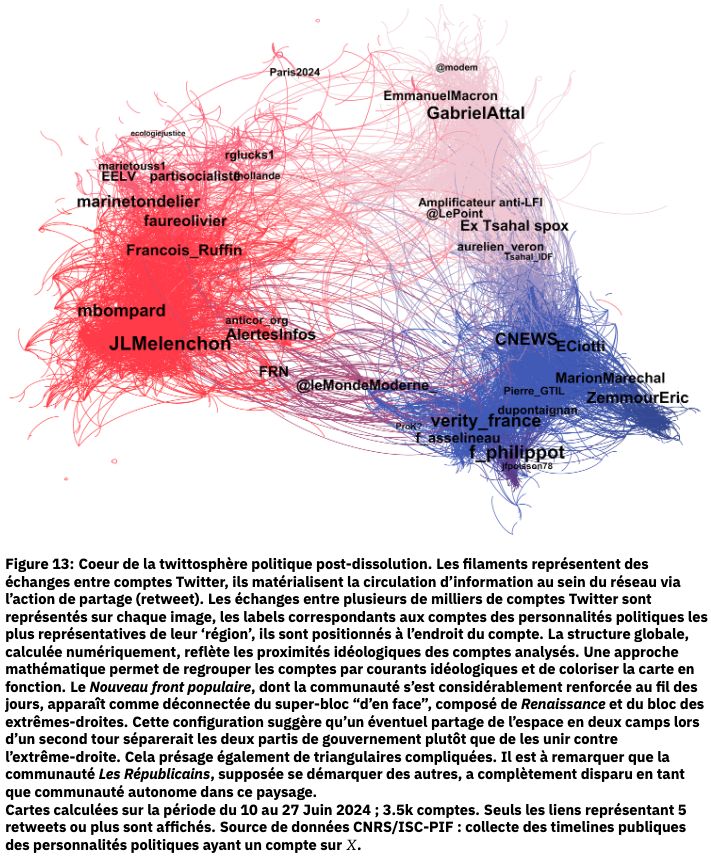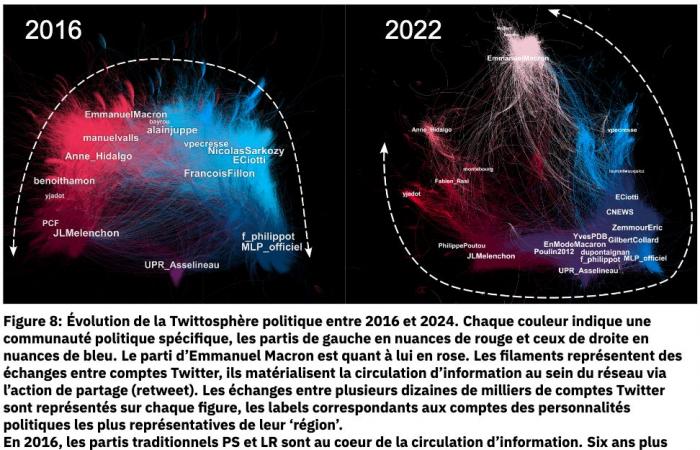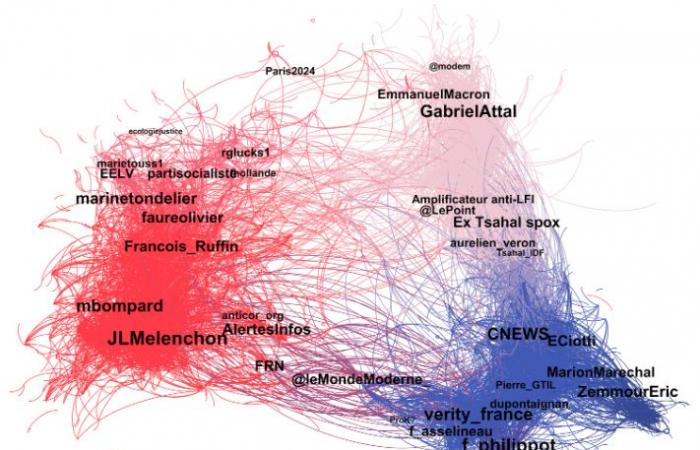Several recent studies have detailed inauthentic activities in political debates held on French X, without their precise impact being easy to qualify.
Although many former X users have left the network since its takeover, politicians and media remain relatively numerous and active, especially during election periods. But what does the activity taking place there look like? How legitimate is it? What does it reflect potential interference in the French (political) debate?
These questions were asked by mathematician and research director at the CNRS Institute of Complex Systems David Chavalarias and analyst Florent Lefebvre (@Flefgraph) and provided complementary answers.
The first published a study (pre-print) on June 30 detailing how, since 2016, low-intensity efforts of Russian origin have been deployed, notably on Twitter/X to “weaken then reverse” the French republican front “in the run-up to the 2024 legislative elections”. In doing so, they favored the promotion of pro-Kremlin interests, rather present on the far right of the French political spectrum.
Over a shorter period of time, the second observed how, in the few weeks before the first round, a completely new community integrated itself into the discourse relating to the legislative elections to direct certain communities towards “anti-government” publications.
The Politoscope: fluoroscopy of the political debate over almost a decade
Between 2016 and 2023, the Politoscope project consisted of collecting a large part of the messages exchanged on Twitter to create “social cards” of the political landscape as it is represented there. This is specific to the social network, which had 10 million active users in France in 2022, the year of its acquisition by Elon Musk.
In total, the mathematician’s team has “analyzed more than 700 million messages sent by nearly 17 million unique users” over the period. In seven years, these observations have made it possible to note the appearance of three communities: that of En Marche, that of Reconquête!, and a third, about which David Chavalarias already warned in his work Toxic Data, described as ” anti-system “. The latter “emerged during the Covid-19 pandemic under the influence of French political leaders, clearly pro-Putin”conspiracy theorists, sovereignists or ideologically far-right.
Ultimately, the monitoring carried out by the team at the CNRS Institute of Complex Systems therefore allowed it to illustrate the transformation of the discussion from a bipolar political landscape (from left to right) to another, tripolar one. In this one, the “anti-system” community serves as a link between La France Insoumise on one side and the extreme right on the other. A movement that took place in parallel with a “large-scale toxification of social interactions” on the platform.
The anti-system community, architect of French polarization
“Under the guise of defending “freedom” against anti-covid measures”“anti-system” influencers “have gradually built one of the most important communities on French political Twitter”, writes David Chavalarias. Above all, by capitalizing on opposition to government measures taken during the pandemic, they managed to position themselves as an intermediary between two currents “fundamentally contradictory” in terms of ideas: part of the left and the extreme right.
Positioning yourself like this is also ideal for acting on “the entire French political landscape, at least on Twitter”, explains the mathematician. In support of his demonstration: the Kremlin Papers, obtained by The Guardian, in which Vladimir Putin’s road map for influencing political life in the United States, and in any other state of interest, was described very precisely. This insisted on the need to “modulate the political-social debate” from the United States so that “delegitimize, in the collective consciousness”the governmental system like the elected president.
For David Chavalarias, the anti-system bloc is perfectly located within the exchanges to operate the same type of modulation on the French fracture opinion.
To identify these ideas that are likely to divide, the mathematician draws on the work of Umberto Eco on the fascist threat. In 1995, the Italian academic wrote in the New York Review of Books: “at the root of fascist psychology, there is the obsession with a conspiracy, perhaps an international one. (…) The simplest way to foil the conspiracy is to appeal to xenophobia. But the conspiracy must also come from within.”
Islamo-leftism and the Israeli-Palestinian conflict, two vectors of French division
The mathematician’s observations show that the debates on Islamo-leftism could have played this role of creating an internal “enemy” over the long term.
Between 2016 and 2021, the concept struggled to emerge: its rare promoters pushed it in a way that “looked exactly like astroturfing”. Among the most active accounts at the time, David Chavalarias noted the presence of @Yxxxx, who tweeted more than 400 times about Islamo-leftism, and now has a profile in Cyrillic. “A quick search reveals that he is a 38-year-old Russian living in Novosibirsk, probably employed at the time in a troll farm. »
Until 2021, the thesis of “Islamo-leftism” is mainly conveyed only by this type of Russian trolls. Until finding an ideal relay in the Minister of Higher Education, who declared in February on CNews to ask the CNRS for a study on the subject. The idea then really enters the public debate, and can begin to function as an independent “information virus”, to use the expression of the historian David Colon, author of The War of Information. This would also have made it possible to implant in many minds a shortcut such as “La France Insoumise (and its allies) = Islamo-leftism = internal enemy”.
According to David Chavalarias, the placement of the anti-system sphere between the left and the far right has also allowed it to take advantage of recent events to overthrow the Republican front that traditionally opposes the National Rally. Taking advantage of the conflict between Israel and Hamas since the attack committed by the latter on October 7, 2023, certain inauthentic accounts have worked to further isolate the rebellious left from the rest of the political spectrum present on X.
A particular account, @FRN, helps illustrate this logic. Historically present in the “anti-system” sphere, it has moved over the past year towards interaction groups marked on the left. He then began to broadcast “exclusively” images and videos “the massacres perpetuated by Netanyahu’s government in Gaza and the resulting humanitarian crisis”.
For David Chavalarias, these publications “are innumerable and unbearable, to the point that watching a few almost inevitably causes post-traumatic stress disorder (PTSD)”. And to participate in pushing those who have been exposed to it to “put the fate of the Palestinians on the table every time we speak”. For Internet users who would not have been exposed to it to the same degree, on the other hand, so many speeches on this specific subject would be “irrational”.

Various anxiety-inducing operations – such as the Star of David graffiti on the walls of Paris and the “red hands” graffiti on the Shoah Memorial, which have been shown to have been orchestrated by Russian networks – have added fuel to the fire. The result, David Chavalarias analyses, is to lock part of the population into false dilemmas: choosing between supporting the Palestinians OR the Jewish population, regretting Islamophobia OR anti-Semitism… At the risk of positioning oneself politically according to this single axis, even though it should remain possible to fight against all hatreds.
In June, wave of creation of “anti-government” accounts
Over a much shorter time frame (from June 6 to 26), Florent Lefebvre looked at the activity directly linked to the legislative elections on impressions, the analyst was able to draw up several observations. First, the RN and Reconquest “camp” have many more spammers, that is to say accounts practicing unwanted tweeting and retweeting, than the other political forces.
Then, he notes the creation of about ten thousand accounts with abnormal behavior, in the month preceding the elections, and which tweeted and retweeted publications directly linked to the legislative elections. While Florent Lefebvre does not formulate any hypothesis on its origin, he emphasizes that this block of abnormal accounts only interacted with communities linked to the New Popular Front and Renaissance, avoiding the entire far-right community.
What concrete effects?
While external agents may have amplified certain discourses and distorted information as it should have “naturally” circulated on X, it remains difficult to attribute a political result on a national scale to this lever of action alone – especially since the platform owned by Elon Musk is far from being the only one at stake. As David Chavalarias himself indicates, the current political climate in France is due to a variety of factors that the sole interference of a nation in our digital debates cannot explain.
It is possible, on the other hand, to bring together bundles of clues. Even before the first round of the legislative elections, a Mediapart investigation highlighted the direct links maintained by around fifteen RN candidates with Putin’s Russia. At the time between the two rounds, around ten are already elected or qualified in the second round, notes La Lettre.
Online, influence operations have also been documented on various platforms. At the end of June, the company Recorded Future showed the activity of Russian and Iranian networks in discussions relating to the legislative elections, while declaring their impact “ negligible ».
In April, AI Forensics pointed out the weakness of the moderation carried out by Meta on its advertising systems. While continuing to work on the subject, researcher Paul Bouchaud (also affiliated with the Institute of Complex Systems) got his hands on a screenshot of a troll’s workspace, which allowed us to observe the organization of teams working to disinform in different countries, including France.
In any case, Maxime Audinet, a political scientist specializing in Russia and its influence practices, urges caution in how to describe the origin of these operations. Describing them as facts directly organized from the Kremlin is most often a simplification, he notes, whose “entrepreneurs of influence” Russians benefit directly.







